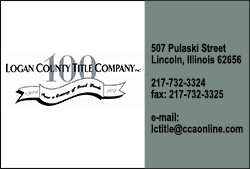 Both were disciplined recently for unethical conduct, both have operated their
event at a financial loss and both come from political backgrounds with no
professional experience managing fairs before taking their jobs with the
Illinois Department of Agriculture. Both were disciplined recently for unethical conduct, both have operated their
event at a financial loss and both come from political backgrounds with no
professional experience managing fairs before taking their jobs with the
Illinois Department of Agriculture.
Amy Bliefnick is the current director of the Illinois State Fair and receives a
salary of $90,408. John Rednour, Jr. left his $91,200 position managing the
DuQuoin State Fair in January. In addition to her salary, Bliefnick is provided
a house on the fairgrounds where she can live.
While recent media attention has focused on the pairs’ ethical transgressions in
accepting gifts from fair vendors, little attention has been paid to how the
pair — or their predecessors — received their jobs in the first place.
The two state fairs, which have lost $71.2 million over the last 20 years, have
long been a patronage bastion.
“George Ryan appointed me State Fair director as a reward for the help I gave
him in getting elected,” said Harold “Bud” Ford who was in charge of the fair
prior to Bliefnick.

“I worked on his campaign and helped George carry 25 counties in northern
Illinois. I let him know that the only position in the administration I was
interested in was heading the State Fair.”
Prior to heading the state fair, Ford was an unsuccessful GOP legislative
candidate and a Moline police officer.
Bliefnick was appointed state fair manager by Gov. Rod Blagojevich after she
made an unsuccessful race as a Democrat for the state legislature.
Gov. Pat Quinn has allowed her to continue in that role although she was
suspended for two days earlier this year for violating state ethics laws for
accepting free beer tent tickets from a State Fair vendor. She was also fined
$1,000 this week by the executive ethics board.
She told Illinois News Network she made a mistake and the tickets were used for
promotional purposes only.
Bliefnick is hardly the first fair manager to come from a political background.
Gov. Jim Edgar appointed Bud Hall to be his State Fair director. Hall was the
brother of a state senator, a frequent tennis partner of Edgar’s and campaign
volunteer for the governor’s campaigns.
“Illinois and New York stand out because those are the two states where people
from political backgrounds tend to get appointed to run state fairs,” said Marla
Calico, chief operating officer of the International Association of Fairs and
Expositions.
Calico said the trend in fair management is to appoint people from backgrounds
other than politics.
“If you look at managers who are involved with fairs today, they come from a
wide variety of backgrounds,” she said. “They may come from facilities
management. They may come from an agricultural background. They may have grown
up in the business.”

Errol McKoy managed the State Fair of Texas for 26 years and routinely ended
each year $8 million to $9 million in the black. Prior to taking the helm at the
fair, he was and executive with Six Flags Entertainment Corporation. He retired
as a fair manager this year.
“These managers who come from backgrounds managing athletic facilities or
entertainment venues or in my case amusement parks have a real advantage over
other managers,” he said. “It is hard for someone to get up to speed if their
background is in something unrelated – like retail. And it’s got to be tough
when the manager is always changing when a new governor is elected.”
[to top of second column]
|

Unlike Illinois, the Texas fair is not a part of state
government.
“We are a nonprofit. We pay for everything out our own pocketbook.
We don’t get a subsidy from anyone. Losing money is not an option
for us,” McKoy said.
All profits generated by the Texas fair are plowed back into
improvements in the fairgrounds, which for most of the year
functions as a Dallas park. The fair pays the city $1.2 million in
rent to the city, McKoy said.
Former DuQuoin State Fair director John Rednour, Jr’s, work
experience was much different than McKoy’s when he took the helm of
the state fair in Southern Illinois.
“I got the job because I helped Rod Blagojevich get elected,” he
said. “I was the Perry County (Democratic) Chair. My dad campaigned
for Rod, too. And the person who had the job before me helped Ryan
get elected and before that it was an Edgar person. But that’s OK.
You want a state fair director who reflects the thinking of the
governor.”
Prior to becoming fair director, Rednour was a local liaison for the
Illinois comptroller. Rednour’s father was a political powerbroker
in Southern Illinois.
Rednour acknowledges that his fair ran a deficit each year during
his 8-year tenure.
“This is an area that has double-digit unemployment. Parents can’t
afford to take their kids to Disney World,” he said. “If you live in
Metropolis, it takes five hours to drive to the Illinois State Fair
in Springfield. This provides those children with an opportunity
they wouldn’t have otherwise.”

The intent of reforms passed in 1993 by the legislature was for
Illinois’ two state fairs to be self-sustaining said Mike Lawrence,
a former senior advisor and press secretary to Gov. Jim Edgar.
That hasn’t been the case.
Between 1993 and 2013 the Illinois State Fair lost $55.9 million and
the DuQuoin State fair has lost $15.3 million according to data
obtained by Illinois News Network from the Illinois Auditor
General’s office. And neither fair had a single year where it broke
even.
Bliefnick, who has been State fair manager for 10 years, said she
isn’t certain it’s possible for the State Fair to operate in the
black. But she added the fair provides a terrific experience for
visitors from across the state.
But McKoy said his experience has been quite different in Texas.
“When I started, the fair had four or five corporate sponsors and we
were taking in $300,000 to $400,000 from them,” he said. “When I
retired, the fair had 60 corporate sponsorships worth $6 million. …
We offer a lot at the fair that appeals to an urban audience as well
as a rural one.”
Scott Reeder is a reporter with the Watchdog affiliate, Illinois
News Network. Reach him at sreeder@ilnews.org.
[This
article courtesy of
Watchdog.]
Click here to respond to the editor about this
article.
 |